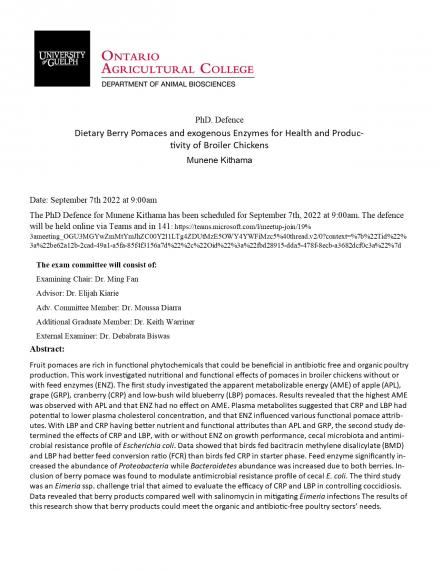Teams and room 141: https://teams.microsoft.com/l/meetup-join/19%3ameeting_OGU3MGYwZmMtYmJhZC00Y2I1LTg4ZDUtMzE5OWY4YWFiMzc5%40thread.v2/0?context=%7b%22Tid%22%3a%22be62a12b-2cad-49a1-a5fa-85f4f3156a7d%22%2c%22Oid%22%3a%22fbd28915-dda5-478f-8ecb-a3682dcf0c3a%22%7d

Fruit pomaces are rich in functional phytochemicals that could be beneficial in antibiotic free and organic poultry production. This work investigated nutritional and functional effects of pomaces in broiler chickens without or with feed enzymes (ENZ). The first study investigated the apparent metabolizable energy (AME) of apple (APL), grape (GRP), cranberry (CRP) and low-bush wild blueberry (LBP) pomaces. Results revealed that the highest AME was observed with APL and that ENZ had no effect on AME. Plasma metabolites suggested that CRP and LBP had potential to lower plasma cholesterol concentration, and that ENZ influenced various functional pomace attributes. With LBP and CRP having better nutrient and functional attributes than APL and GRP, the second study determined the effects of CRP and LBP, with or without ENZ on growth performance, cecal microbiota and antimicrobial resistance profile of Escherichia coli. Data showed that birds fed bacitracin methylene disalicylate (BMD) and LBP had better feed conversion ratio (FCR) than birds fed CRP in starter phase. Feed enzyme significantly increased the abundance of Proteobacteria while Bacteroidetes abundance was increased due to both berries. Inclusion of berry pomace was found to modulate antimicrobial resistance profile of cecal E. coli. The third study was an Eimeria ssp. challenge trial that aimed to evaluate the efficacy of CRP and LBP in controlling coccidiosis. Data revealed that berry products compared well with salinomycin in mitigating Eimeria infections The results of this research show that berry products could meet the organic and antibiotic-free poultry sectors’ needs.

